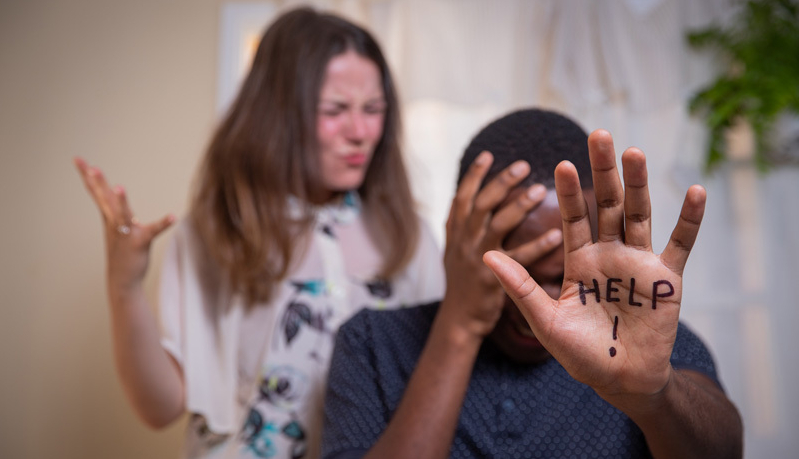
Domestic violence. It has been well known since ancient times. It can happen anywhere. What is domestic violence and why is it becoming more of an overwhelming issue?
In 2007 United Nations Secretary General, Ban Ki Moon noted,
"Violence against women continues to persist as one of the most heinous, systematic and prevalent human rights abuses in the world. It is a threat to all women, and an obstacle to all our efforts for development, peace, and gender equality in all societies."
Domestic violence affects all genders
The number of male domestic abuse victims is shockingly high. Why don’t we hear about them?
Like Ban Ki Moon, when we talk about domestic violence we immediately think of women. There is rarely any mention of men as victims of ‘domestic abuse’. Yet the number of male domestic abuse victims is shockingly high.
Why don’t we hear about them? I suspect for the same reason abuse among women is hushed up. We are ashamed to talk about it. Especially about men being abused by girlfriends, wives and mothers. They also feel ashamed. They're laughed at and mocked for being under a woman's thumb. Thus many might not come out openly. But we know they are there because a few men do speak out and acknowledge that they are also victims of domestic abuse.
Domestic violence happens everywhere
We need to be aware of all perpetrators of domestic violence regardless of gender. We need to examine why they are doing it, and consider how to help at the root cause. But in order to do that we must first realize that domestic violence or abuse is not an issue in only one country or in developing countries, it happens right across the world.
No matter which part of the globe one comes from, domestic violence exists in different forms, and it can increase when living in contexts of great uncertainty and stress (e.g. income insecurity). It has to be recognized and addressed. We cannot afford to keep sweeping it under the carpet.
Ask yourself, how common do I think that domestic violence against is in my family, society, community, culture, and in my country? It can present in various forms: sexual assault, emotional abuse, verbal abuse, physical abuse, and economical abuse. It is also apparent as withholding or restricting, harassment, bullying, and 'gaslighting'. It is more of a pattern than an isolated event and it has a higher rate of repeat victimization than any other type of crime.
Domestic violence indicators
It can be an uphill task to unveil the fears, hurts, and trauma of children, women, and men who have been abused. Often it is endured for years before the victim comes to a point of seeking counseling or help from the legal system to set them free of the abuse.
If you are close to a person who you suspect is being abused, some symptoms to look for include: injuries to the hands, neck, head, face, chest, abdomen (and genitals if you are a medical specialist), a history of miscarriages, multiple bruises, burns and scars in different stages of healing, headaches, mood swings, suicidal attempts, constant complaints of not feeling well, using lots of alcohol, misusing medication, difficulty concentrating, unable to sleep, withdrawal or going into isolation. Lack of self confidence or autonomy and needing to seek another's permission (usually the abuser's) could also be indicators. Not willing to see friends, colleagues and neighbors, frequently away from work place, unusual absence from social gatherings, signs of high anxiety and stress in otherwise safe contexts, etc. can suggest a person is a victim of abuse.
Victims are often too embarrassed to talk about abuse out of shame and fear, so they try to act normal and live in denial that everything is fine. They might also think that they have too much to lose if they expose it, especially if financial dependence is involved. The fear of unbearable loss is a powerful motivator keeping people within abusive relationships.
Domestic violence causes and treatment
Domestic violence is a complex issue with many root causes. Psychologists commonly point to the need for power and control as underlying issues with the abuser.
It can be shocking to see the pain and trauma inflicted upon victims of domestic violence. Within societies and within our churches and other Christian organizations, there much to talk about regarding this issue and much to learn about how one can help and counsel them. It can start with being a good friend, but victims often need more specialist help. Whether as a friend or a professional, caregivers need to build trust and understanding before victims will open up and talk about pain and injury to their mind and body. Even then, it can be a long road to healing and growth.
Domestic violence needs to be addressed
As a caregiver or counselor, are we addressing domestic violence? Are we talking about these issues? Are we acknowledging the occurrences of violence when we detect signs of it, and are we willing to go the distance to help the victims? Or are we keeping "mum" (quiet)?
If we suspect a friend is being abused, we can at least ask sensitive questions, be willing to listen well, offer prayer, and find and recommend specialist help. As followers of Jesus, let us be hope-givers to the victims of domestic violence.
A version of this essay was previously published as blog post by Miila Consulting. Republished with permission.
Dr Pramila Rajendran worked with Operation Mobilization an International organization for over 20 years in different Leadership capacities, both in India and overseas. She pioneered the Member Care Network for Indian missions and has raised awareness for the need of missionary care, counseling, and therapy for ministry personnel. From her base in Bengaluru/Bangalore, Pramila is the founding director and counselor at Miila Consulting, a counseling and training provider.





